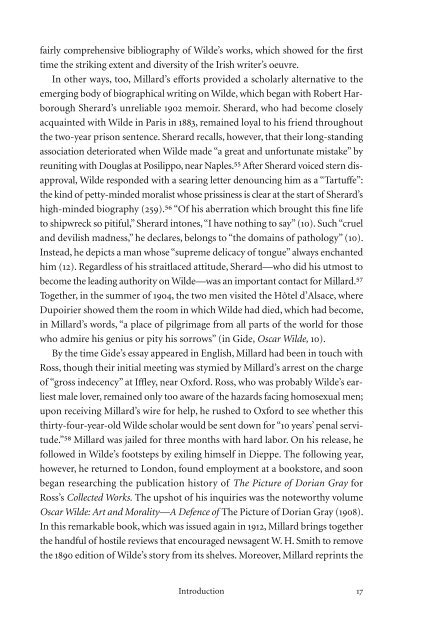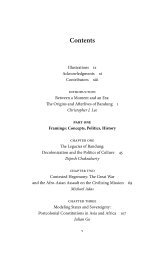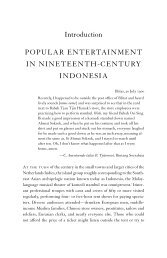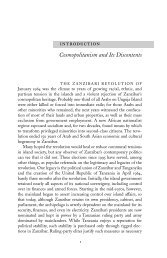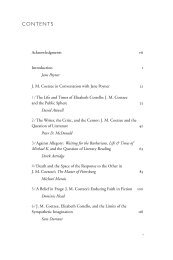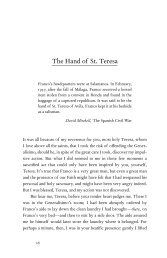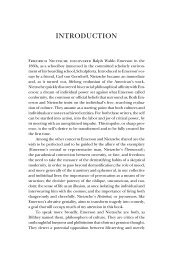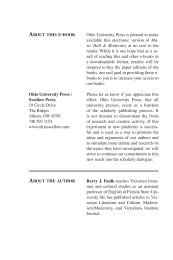Oscar Wilde and Modern Culture - Ohio University Press & Swallow ...
Oscar Wilde and Modern Culture - Ohio University Press & Swallow ...
Oscar Wilde and Modern Culture - Ohio University Press & Swallow ...
You also want an ePaper? Increase the reach of your titles
YUMPU automatically turns print PDFs into web optimized ePapers that Google loves.
fairly comprehensive bibliography of <strong>Wilde</strong>’s works, which showed for the first<br />
time the striking extent <strong>and</strong> diversity of the Irish writer’s oeuvre.<br />
In other ways, too, Millard’s efforts provided a scholarly alternative to the<br />
emerging body of biographical writing on <strong>Wilde</strong>, which began with Robert Harborough<br />
Sherard’s unreliable 1902 memoir. Sherard, who had become closely<br />
acquainted with <strong>Wilde</strong> in Paris in 1883, remained loyal to his friend throughout<br />
the two-year prison sentence. Sherard recalls, however, that their long-st<strong>and</strong>ing<br />
association deteriorated when <strong>Wilde</strong> made “a great <strong>and</strong> unfortunate mistake” by<br />
reuniting with Douglas at Posilippo, near Naples.₅₅ After Sherard voiced stern disapproval,<br />
<strong>Wilde</strong> responded with a searing letter denouncing him as a “Tartuffe”:<br />
the kind of petty-minded moralist whose prissiness is clear at the start of Sherard’s<br />
high-minded biography (259).₅₆ “Of his aberration which brought this fine life<br />
to shipwreck so pitiful,” Sherard intones, “I have nothing to say” (10). Such “cruel<br />
<strong>and</strong> devilish madness,” he declares, belongs to “the domains of pathology” (10).<br />
Instead, he depicts a man whose “supreme delicacy of tongue” always enchanted<br />
him (12). Regardless of his straitlaced attitude, Sherard—who did his utmost to<br />
become the leading authority on <strong>Wilde</strong>—was an important contact for Millard.₅⁷<br />
Together, in the summer of 1904, the two men visited the Hôtel d’Alsace, where<br />
Dupoirier showed them the room in which <strong>Wilde</strong> had died, which had become,<br />
in Millard’s words, “a place of pilgrimage from all parts of the world for those<br />
who admire his genius or pity his sorrows” (in Gide, <strong>Oscar</strong> <strong>Wilde</strong>, 10).<br />
By the time Gide’s essay appeared in English, Millard had been in touch with<br />
Ross, though their initial meeting was stymied by Millard’s arrest on the charge<br />
of “gross indecency” at Iffley, near Oxford. Ross, who was probably <strong>Wilde</strong>’s earliest<br />
male lover, remained only too aware of the hazards facing homosexual men;<br />
upon receiving Millard’s wire for help, he rushed to Oxford to see whether this<br />
thirty-four-year-old <strong>Wilde</strong> scholar would be sent down for “10 years’ penal servitude.”₅⁸<br />
Millard was jailed for three months with hard labor. On his release, he<br />
followed in <strong>Wilde</strong>’s footsteps by exiling himself in Dieppe. The following year,<br />
however, he returned to London, found employment at a bookstore, <strong>and</strong> soon<br />
began researching the publication history of The Picture of Dorian Gray for<br />
Ross’s Collected Works. The upshot of his inquiries was the noteworthy volume<br />
<strong>Oscar</strong> <strong>Wilde</strong>: Art <strong>and</strong> Morality—A Defence of The Picture of Dorian Gray (1908).<br />
In this remarkable book, which was issued again in 1912, Millard brings together<br />
the h<strong>and</strong>ful of hostile reviews that encouraged newsagent W. H. Smith to remove<br />
the 1890 edition of <strong>Wilde</strong>’s story from its shelves. Moreover, Millard reprints the<br />
Introduction 17


